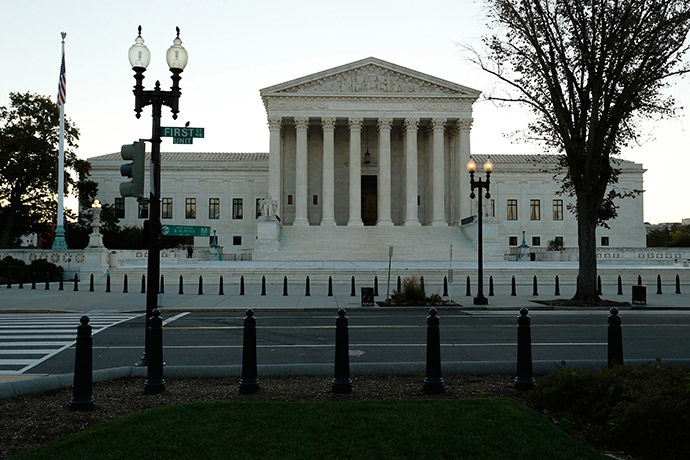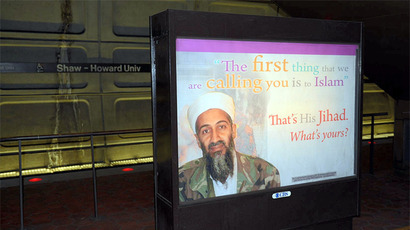Are online death threats free speech? Supreme Court hears arguments

The US Supreme Court heard arguments on Monday in a case to determine whether the First Amendment of the Constitution protects death threats made on the internet as free speech.
In what could be a far-reaching case to examine the limits of free speech online, the case involves a man who vented against his estranged wife as well as others, posting graphic lyrics threatening to kill them.
Everything you need to know about the Supreme Court case over Facebook threats and freedom of speech http://t.co/4ZKQblS9rS by @fidmart85
— Ted Hesson (@tedhesson) December 1, 2014
On Monday, the Supreme Court heard arguments in the case – Elonis v. United States – which centers on Anthony Elonis from Pennsylvania after he posted graphically violent rap lyrics on Facebook about his wife.
READ MORE:US college cancels classes over wave of on-campus hate speech
His venting began after his spouse left him, taking the couple’s two children along with her. Elonis, who often posted under the alias 'Tone Dougie,” began writing about killing his wife, attacking a kindergarten, and committing violence against an FBI agent who visited him in the wake of the threats.
“There's one way to love ya, but a thousand ways to kill ya,” he wrote. “And I'm not going to rest until your body is a mess, soaked in blood and dying from all the little cuts. Hurry up and die bitch.”
His wife says she felt threatened and sought protection from the court. Elonis was indicted on five counts of interstate communication of illegal threats. The jury convicted him on the grounds that these represented true threats and sentenced him to four years in federal prison. However, Elonis claims the posts should not be taken seriously and he was exercising his First Amendment right to free speech.
Elonis subsequently appealed the case to the Supreme Court.

The petitioner’s attorney maintains his client didn’t intend to place his wife in fear and that the posts all came with disclaimers stating not to take it seriously. The government maintains Elonis’ posts were threatening, and that he knew the effect they would have on his wife.
In court, some Supreme Court justices seemed concerned that the government's position is too broad and risks sweeping in language protected by the First Amendment. Yet there seemed to be little agreement over what standard to use.
"How does one prove what's in somebody else's mind?" asked Justice Ruth Bader Ginsburg, according to the Associated Press.
Supreme Court Listening to Wu Tang and Eminem: https://t.co/zxTwDQQj5G ht @ChrisTsakis
— WFMU (@WFMU) December 1, 2014
Elonis’ attorney, John Elwood, said the speaker’s intent could be understood by context through a search of cell phone records and other evidence. He cited another case where, in a video game chat room, teenagers were making sarcastic comments and one made a comment about shooting up a kindergarten after another teen called him a crazy. The teenager threatening the kindergarten wound up getting thrown into jail after a woman in the same chat room reported the comments.
READ MORE:San Francisco runs controversial anti-Muslim bus ads, sparking harsh criticism (
Chief Justice John Roberts suggested the government's standard simply would be whether a reasonable person familiar with teenagers in video game chat rooms would view it as a threat. But Elwood argued that everyone has a different view of context, and a better standard would be looking at what the speaker intended.
Justice Elena Kagan asked whether there should be a "buffer zone" under the First Amendment "to ensure that even stuff that is wrongful maybe is permitted because we don't want to chill innocent behavior."
READ MORE:Twitter sued for $50m after refusing to reveal anti-Semitic tweeter identities
The Supreme Court has said that true threats to another person are not protected speech under the First Amendment, but “political hyperbole” or “unpleasantly sharp attacks” [comedy] are protected speech.
What Today's #Facebook#SCOTUS Case Means for Free Speech Online: http://t.co/Q1ehINKcSx
— ACLU SoCal (@ACLU_SoCal) December 1, 2014
The case has drawn widespread attention from free speech advocates who say that comments on Facebook, Twitter, and other social media can be hasty, impulsive, and easily misinterpreted.
“A statute that proscribes speech without regard to the speaker’s intended meaning runs the risk of punishing protected First Amendment expression simply because it is crudely or zealously expressed,” said a brief from the American Civil Liberties Union and other groups on Monday.














